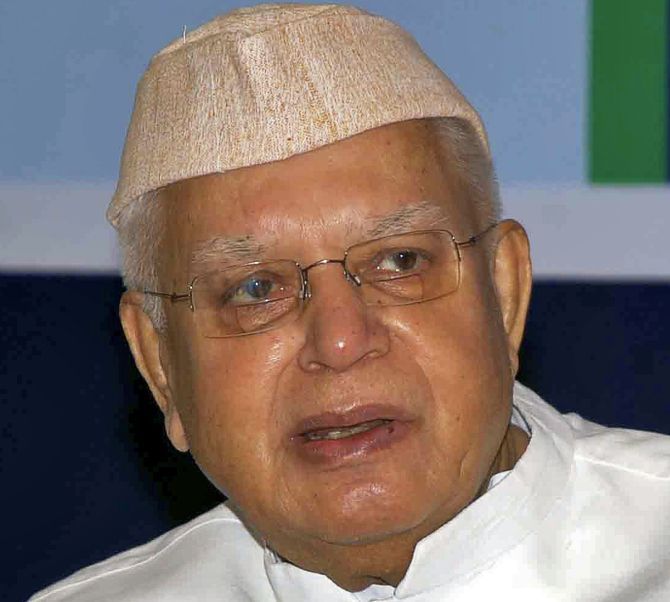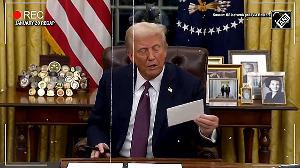Narayan Dutt Tiwari’s long political career included helming Uttar Pradesh three times as chief minister, becoming the only Uttarakhand CM to complete a full term and holding key portfolios at the Centre.

But these achievements are eclipsed somewhat by a couple of controversies that dogged him in the later years of his life -- the Andhra Pradesh Raj Bhavan sex scandal and the paternity suit of a love child filed against him when he was well into his 80s.
Tiwari, who died Thursday on his 93rd birthday, won his first election on a Praja Socialist Party ticket from Nainital in 1952. A decade later, he joined the Congress and stuck with it for most of his life.
There was a brief period, however, in the 1990s when he floated his own All India Indira Congress (Tiwari) with Arjun Singh also on board.
And last year, long after he had outlived his usefulness for his party, Tiwari openly announced his support for the Bharatiya Janata Party ahead of the assembly elections in Uttarakhand.
Tiwari’s political career began before Independence. As a teenager, he was jailed for 15 months in Nainital prison, according to one account for writing anti-British pamphlets, where his freedom fighter father too was lodged.
On his release, he joined Allahabad University, becoming the president of its student union in 1947.
In 1976, he became the chief minister of Uttar Pradesh for the first time. Two more stints followed in the 1980s. They were all brief, truncated terms but he will be remembered for being the last Congress chief minister of the populous, politically important state.
At the Centre, Tiwari served as deputy chairperson of the Planning Commission. Over the years, he also held portfolios of planning, finance, petroleum and external affairs in the Union Cabinet.
Tiwari is said to have nurtured prime ministerial aspirations at one time, and there was speculation that he was in the running in 1991 when the party eventually picked P V Narasimha Rao.
That was also the year when he lost his Nainital seat by just 800 votes.
He was the third chief minister of the newly formed Uttarakhand state but the first one to complete a full term, from 2002 to 2007. He continues to hold the distinction of having been the only Uttarakhand CM who has done so.
Tiwari is credited with helping the infant state; formed just two years before he took charge, gain a firm footing.
His rapport with his opposition colleagues is said to have got Uttarakhand an industrial package from the Atal Bihari Vajpayee government at the Centre, which was crucial for the state’s early development. He then wooed industrialists.
Bajaj Auto chairman Rahul Bajaj once said, “The plant we set up in Pantnagar was only at Tiwari ji’s request. We could not say no to him.”
In 2007, he accepted the governorship of Andhra Pradesh. Two years later, a video clip showing three women in bed with an elderly man in Raj Bhavan brought the veteran politician’s career virtually to an end.
Citing “health grounds”, he put in his papers and shifted to Dehradun. In 2008, Rohit Shekhar filed a paternity suit claiming that Tiwari was his biological father.
The result in 2012 of a court-ordered DNA test proved the claim right. Tiwari pleaded with the media to let him be himself.
“I have every right to live my life my way. No one has the right to look into my private life. Please respect my privacy,” he was quoted as saying.
In 2014, Tiwari married Shekhar’s mother Ujjwala Sharma in Lucknow, finding a new family in the mother and son at the age of 88.











 © 2025
© 2025